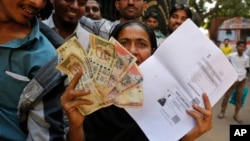India's top court on Monday upheld a 2016 move by the government to demonetize 86% of the country's circulating cash, a decision the court said that was taken in consultation with India's central bank.
Only one member of the five-judge Supreme Court bench wrote a dissenting opinion.
The four judges who upheld the measure said the November 2016 currency ban did "not suffer any flaws."
Dissenting Justice B.V. Nagarathna said the decision was "unlawful" and "an exercise of power, contrary to law."
In November 2016, Prime Minister Narendra Modi made the surprising decision to withdraw all 500-rupee and 1,000-rupee notes from circulation in an effort to root out illegally hoarded cash, fight corruption and crack down on money laundering and terrorist financing.
The currency ban became known as demonetization.
The immediate result of Modi's demonetization move was financial chaos with thousands of cash-dependent Indians lining up outside banks and ATMs to retrieve their cash deposits, while small businesses and manufacturers suffered losses.
India's main opposition Congress party said the currency ban was "a singularly disastrous move."
India eventually released new currency notes.
Some information in this report came from The Associated Press and Reuters.




